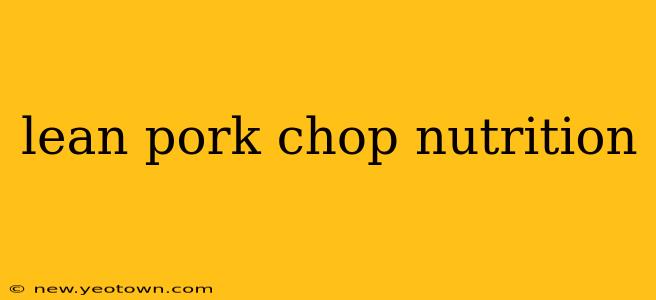Let's be honest, the image of a juicy, perfectly cooked pork chop conjures up comfort and deliciousness. But beyond the taste, lies a nutritional powerhouse, especially when you opt for lean cuts. This isn't your grandma's heavy, fatty pork chop; lean pork is a modern marvel, packed with protein and essential nutrients, making it a fantastic addition to a healthy diet. This journey into the world of lean pork chop nutrition will uncover its surprising benefits and answer some common questions.
What are the Nutritional Benefits of Lean Pork Chops?
Imagine this: you're craving a satisfying meal that's also good for you. A lean pork chop delivers! It's an excellent source of high-quality protein, crucial for building and repairing tissues, supporting a healthy immune system, and keeping you feeling full and energized. But the protein isn't the only star; lean pork also boasts a good amount of essential vitamins and minerals. We're talking B vitamins (like thiamin, riboflavin, and niacin), vital for energy metabolism and nerve function; and zinc, a key player in immune function and wound healing. Plus, it provides a decent dose of iron, crucial for oxygen transport in the blood.
How Many Calories are in a Lean Pork Chop?
The calorie count in a lean pork chop varies depending on the size and cut. However, a 3-ounce serving of lean pork chop typically contains around 150-200 calories. This is significantly less than many other protein sources, making it a great option for weight management. Remember, cooking methods also influence the calorie count. Grilling or baking is generally preferable to frying, as frying adds extra calories and fat.
Is Lean Pork High in Fat?
This is a common misconception. While pork chops can be high in fat, lean cuts significantly reduce the fat content. Look for pork chops labeled "loin" or "tenderloin"—these are generally the leanest options. Trimming visible fat before cooking further minimizes the fat intake. Choosing lean cuts helps keep the fat content low and enhances the nutritional benefits.
Is Lean Pork Good for Weight Loss?
Absolutely! Lean pork's high protein content contributes to satiety, meaning you'll feel fuller for longer, potentially reducing overall calorie intake. This, coupled with its relatively lower calorie count compared to some other protein sources, makes it a valuable ally in weight management strategies. Remember that a balanced diet and regular exercise are key components of any successful weight loss plan.
How Much Lean Pork Should I Eat Per Day?
The recommended daily protein intake varies based on factors like age, activity level, and overall health goals. However, a 3-4 ounce lean pork chop can be a perfectly portioned part of a balanced meal. Remember to consult a healthcare professional or registered dietitian for personalized dietary advice.
What are Some Healthy Ways to Cook Lean Pork Chops?
Forget the deep fryer! Embrace healthier cooking methods to preserve the leanness and maximize the flavor of your pork chop. Grilling, baking, pan-searing (with a little oil), and broiling are all excellent choices. Experiment with herbs and spices to add flavor without extra calories or fat. A simple marinade with lemon juice, garlic, and herbs can elevate a lean pork chop to culinary perfection.
Conclusion: Embracing Lean Pork in a Healthy Diet
Lean pork chops are more than just a delicious meal; they're a smart and nutritious choice for those seeking a balanced diet. Packed with protein, essential vitamins, and minerals, and relatively low in calories and fat (when choosing lean cuts), they can be a valuable part of a healthy lifestyle, contributing to weight management and overall well-being. So, the next time you're planning your meals, don't hesitate to include this versatile and nutritious protein source. You won't be disappointed!

